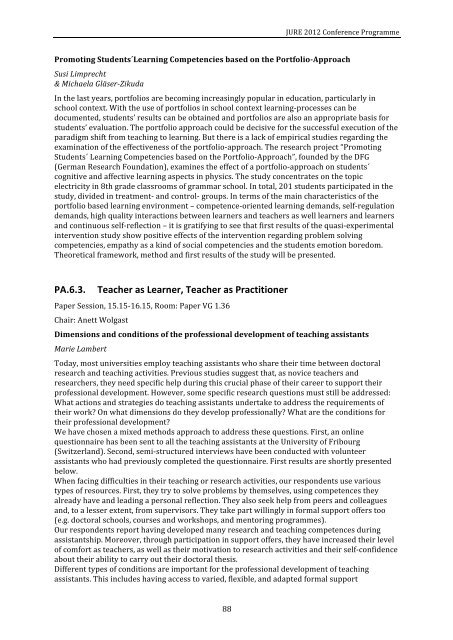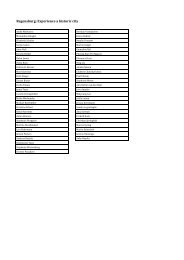JURE 2012 Programme book - EARLI Jure 2012
JURE 2012 Programme book - EARLI Jure 2012
JURE 2012 Programme book - EARLI Jure 2012
Create successful ePaper yourself
Turn your PDF publications into a flip-book with our unique Google optimized e-Paper software.
88<br />
<strong>JURE</strong> <strong>2012</strong> Conference <strong>Programme</strong><br />
Promoting Students´Learning Competencies based on the Portfolio-‐Approach<br />
Susi Limprecht<br />
& Michaela Gläser-‐Zikuda<br />
In the last years, portfolios are becoming increasingly popular in education, particularly in<br />
school context. With the use of portfolios in school context learning-‐processes can be<br />
documented, students’ results can be obtained and portfolios are also an appropriate basis for<br />
students’ evaluation. The portfolio approach could be decisive for the successful execution of the<br />
paradigm shift from teaching to learning. But there is a lack of empirical studies regarding the<br />
examination of the effectiveness of the portfolio-‐approach. The research project “Promoting<br />
Students´ Learning Competencies based on the Portfolio-‐Approach”, founded by the DFG<br />
(German Research Foundation), examines the effect of a portfolio-‐approach on students´<br />
cognitive and affective learning aspects in physics. The study concentrates on the topic<br />
electricity in 8th grade classrooms of grammar school. In total, 201 students participated in the<br />
study, divided in treatment-‐ and control-‐ groups. In terms of the main characteristics of the<br />
portfolio based learning environment – competence-‐oriented learning demands, self-‐regulation<br />
demands, high quality interactions between learners and teachers as well learners and learners<br />
and continuous self-‐reflection – it is gratifying to see that first results of the quasi-‐experimental<br />
intervention study show positive effects of the intervention regarding problem solving<br />
competencies, empathy as a kind of social competencies and the students emotion boredom.<br />
Theoretical framework, method and first results of the study will be presented.<br />
PA.6.3. Teacher as Learner, Teacher as Practitioner<br />
Paper Session, 15.15-‐16.15, Room: Paper VG 1.36<br />
Chair: Anett Wolgast<br />
Dimensions and conditions of the professional development of teaching assistants<br />
Marie Lambert<br />
Today, most universities employ teaching assistants who share their time between doctoral<br />
research and teaching activities. Previous studies suggest that, as novice teachers and<br />
researchers, they need specific help during this crucial phase of their career to support their<br />
professional development. However, some specific research questions must still be addressed:<br />
What actions and strategies do teaching assistants undertake to address the requirements of<br />
their work? On what dimensions do they develop professionally? What are the conditions for<br />
their professional development?<br />
We have chosen a mixed methods approach to address these questions. First, an online<br />
questionnaire has been sent to all the teaching assistants at the University of Fribourg<br />
(Switzerland). Second, semi-‐structured interviews have been conducted with volunteer<br />
assistants who had previously completed the questionnaire. First results are shortly presented<br />
below.<br />
When facing difficulties in their teaching or research activities, our respondents use various<br />
types of resources. First, they try to solve problems by themselves, using competences they<br />
already have and leading a personal reflection. They also seek help from peers and colleagues<br />
and, to a lesser extent, from supervisors. They take part willingly in formal support offers too<br />
(e.g. doctoral schools, courses and workshops, and mentoring programmes).<br />
Our respondents report having developed many research and teaching competences during<br />
assistantship. Moreover, through participation in support offers, they have increased their level<br />
of comfort as teachers, as well as their motivation to research activities and their self-‐confidence<br />
about their ability to carry out their doctoral thesis.<br />
Different types of conditions are important for the professional development of teaching<br />
assistants. This includes having access to varied, flexible, and adapted formal support



